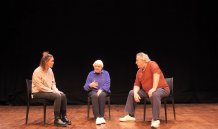
L-R: Sally Geake, Gill Cree and Steve Bennett
Documentary film about improving the experience of living with dementia premieres
An innovative and interactive play exploring communication involving people with dementia has been made into a film.
The World Turned Upside Down, part of the University of Exeter-led research programme Improving the Experience of Dementia and Enhancing Active Life (IDEAL), had a run of three live theatre performances in January 2022. Two public performances took place at the University of Exeter and Exeter Phoenix, and the third was for Exeter College drama students.
In the live performances director Paul Jepson invited the audience to engage with the scenarios presented by suggesting ways in which the actors could replay the scenes to change the outcomes. This sparked insightful reflections and ideas on how we can have conversations that achieve better results, whether for people living with dementia, family members, health professionals, or others involved.
The production team has made a documentary film about the project featuring scenes from the live performances, rehearsals, and audience reactions which will serve as a resource for anyone interested in dementia.
Professor Linda Clare, Chief Investigator of the IDEAL programme, said: “The World Turned Upside Down brings to life some of what we have learned in the IDEAL research programme. Good relationships and good communication are central to living well with dementia but can be difficult to sustain. This often very moving production gets to the essence of good communication and suggests ways in which we can do better.”
The World Turned Upside Down, premieres online today (23rd September) during World Alzheimer’s Month. The film features 83-year-old actor Gill Cree who made a comeback to acting for this project. It also features actors Sally Geake and Steve Bennett who play multiple roles in this interactive research-led production.
Paul Jepson, director of the play, said: “As I listened to the people living with dementia who we met for the project I was astonished by their courage and ingenuity. It would be wrong to suggest that the range of feeling was relentlessly positive because these events are clearly extremely unwelcome. None the less people learn ways to live well.
“I was also struck by how hard it is to care well. A little word that I for one use somewhat carelessly for a very big thing. I hope that, ably supported as we were, we have made a contribution to helping people understand the value of care and hearing the point of view of all those who live with dementia.”
The Improving the Experience of Dementia and Enhancing Active Life (IDEAL) programme is funded as an Alzheimer’s Society Centre of Excellence and was previously funded by the Economic and Social Research Council (ESRC), which is part of UK Research and Innovation (UKRI), and by the National Institute for Health Research (NIHR). It is supported by the NIHR Applied Research Collaboration South West Peninsula (PenARC). IDEAL seeks to understand and find ways to improve the experience of living with dementia.
Commenting on how the play was informed by research, Dr Claire Pentecost, producer of the play and film, said: “We really wanted to make the play seem as authentic as possible, and so we made sure the actors had exposure to real life experiences from people with dementia from our research to develop credible characters. They met with our advisory group on several occasions to ask questions and hear about what it is really like to live with the condition.”
Katherine Gray, research communications manager at Alzheimer’s Society said: “We’ve been proudly funding the IDEAL study since 2017 because it puts people affected by dementia at the heart of its research. This film was no different – it was guided by lived experience, allowing people with dementia and their families’ voices to be heard throughout.
“Many families affected by dementia struggle to get enough support after a diagnosis, as depicted in the scene where a son finds it difficult to manage his own life while also caring for his mother. We hope that by highlighting realistic scenarios like these, everyone – from healthcare professionals to family members – will understand more about the challenges people with dementia face and how to better to support them.”
The World Turned Upside Down is freely available to watch online. Accompanying materials from the IDEAL programme can be found here.
Date: 23 September 2022
